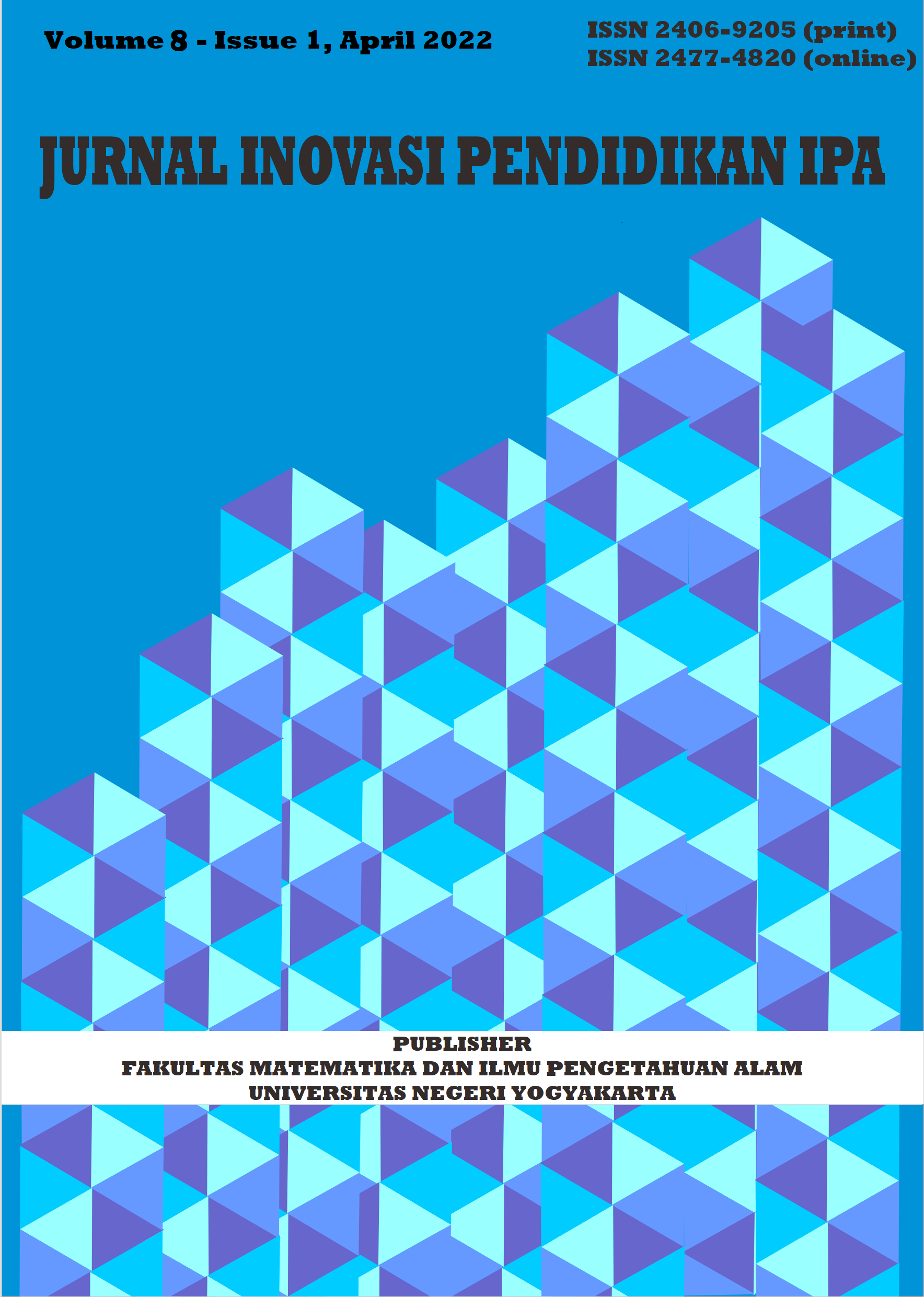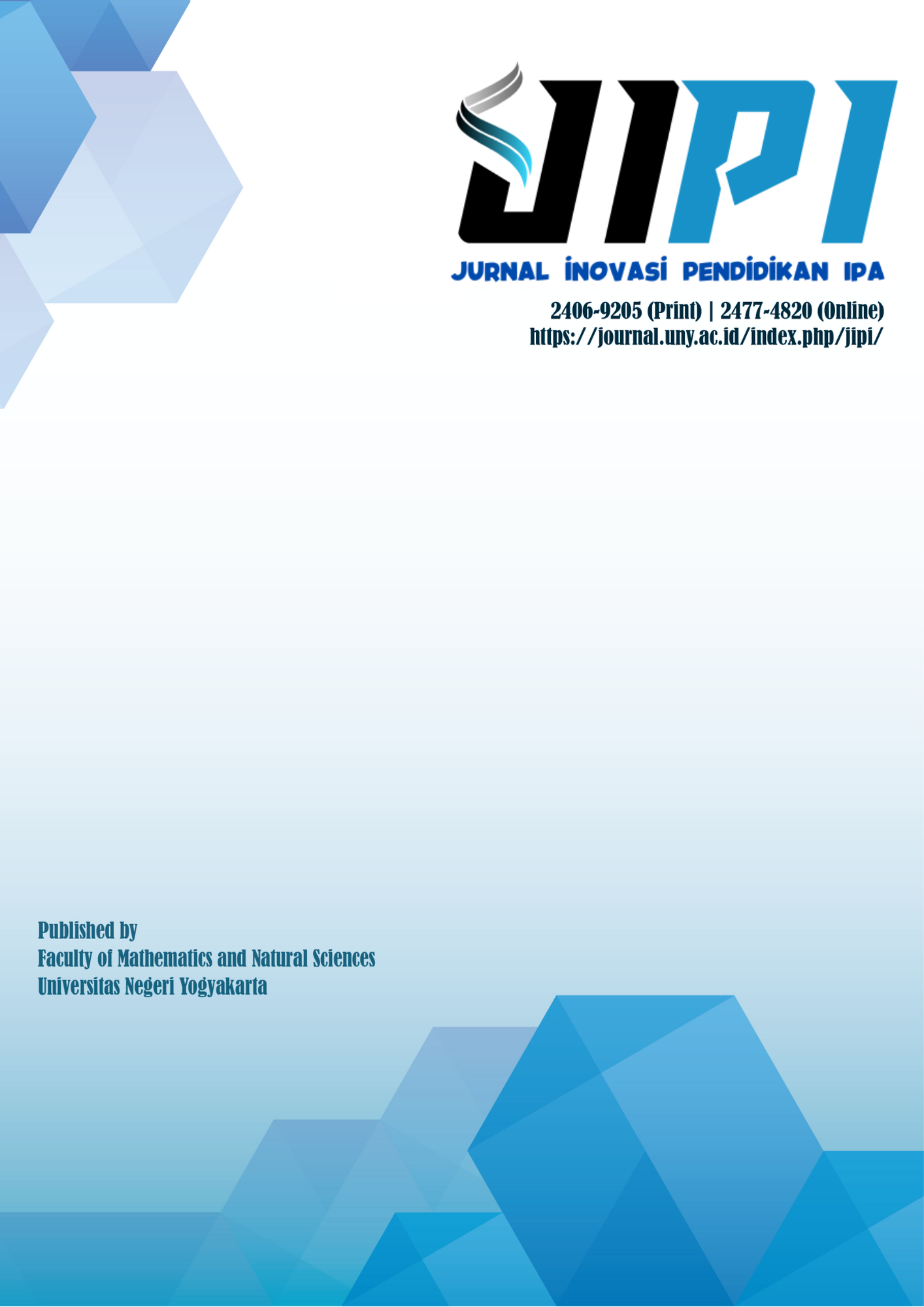Implementing web-based e-scaffolding enhances learning (ESEL) at the center of mass conceptual understanding
DOI:
https://doi.org/10.21831/jipi.v8i1.46476Keywords:
E-scaffolding, web based, online learningAbstract
Many online learning models are alternatives due to the Covid-19 pandemic in synchronous, asynchronous, or mixed-mode. However, resources to support independent student learning in Indonesia were still limited. The focus topic of the study is developing students' understanding of the physics concept of center of mass. A Web-based E-Scaffolding Enhance Learning (ESEL) was identified and implemented. This study used a quasi-experiment, one group, pretest-posttest design. Forty-one students participated in the research. The ESEL model involved four phases: sense-making, process management, articulation, and reflection. Students undertook ESEL-based activity developed for the online asynchronous mode implementation. In addition, synchronous meetings and sharing of learning results using an online platform. Data analysis shows that the web-based ESEL model supported online learning of the center of mass concept, though some improvements are possible. Specifically, learning outcomes increased with a significant value increase between the pre-test and post-test, and a normalized gain score of 0.73 indicated effective learning in high criteria. This research shows that the web-based ESEL approach is an effective self-directed learning tool for online physics classrooms.
References
Ardiyati, T. K., Wilujeng, I., Kuswanto, H., & Jumadi. (2019). The effect of the scaffolding approach assisted by PhET simulation on the achievement of science process skills in physics. Journal of Physics: Conference Series, 1233. https://doi.org/10.1088/1742-6596/1233/1/012035
Basu, S., Biswas, G., & Kinnebrew, J. S. (2017). Learner modeling for adaptive scaffolding in a computational thinking-based science learning environment. User Modeling and User-Adapted Interaction, 27(1), 5-53. https://doi.org/10.1007/s11257-017-9187-0
Brauer, S., Korhonen, A. M., & Siklander, P. (2019). Online scaffolding in digital open badge-driven learning. Educational Research, 61(1), 53-69. https://doi.org/10.1080/00131881.2018.1562953
Cai, Z., Mao, P., Wang, D., He, J., Chen, X., & Fan, X. (2022). Effects of Scaffolding in Digital Game-Based Learning on Student's Achievement: a Three-Level Meta-analysis. Educational Psychology Review, 1-38. https://doi.org/10.1007/s10648-021-09655-0
Dasilva, B. E., Kuswanto, H., Wilujeng, I., & Jumadi. (2019). SSP development with a scaffolding approach assisted by PhET simulation on light refraction to improve students' critical thinking skills and achievement of science process skills. Journal of Physics: Conference Series, 1233(1). https://doi.org/10.1088/1742-6596/1233/1/012044
Dewi, P. S., Rochintaniawati, D., & Siahaan, P. (2020). Profiling the context of natural history teacher candidate for the elementary school degree through web-based inquiry. Jurnal Inovasi Pendidikan IPA, 6(1), 49-58. https://doi.org/10.21831/jipi.v6i1.30991
Emmel, N. (2013). Sampling and choosing cases in qualitative research: A realist approach. Sage.
Hamid, R., Sentryo, I., & Hasan, S. (2020). Online learning and its problems in the Covid-19 emergency period. Jurnal Prima Edukasia, 8(1), 86–95. https://doi.org/10.21831/jpe.v8i1.32165
Jumaat, N. F., & Tasir, Z. (2014). Instructional scaffolding in an online learning environment: A meta-analysis. Proceedings - 2014 International Conference on Teaching and Learning in Computing and Engineering, IEEE, 74–77. https://doi.org/10.1109/LaTiCE.2014.22
Kim, N. J., Belland, B. R., & Axelrod, D. (2018). Scaffolding for an optimal challenge in K–12 problem-based learning. The Interdisciplinary Journal of Problem-based Learning. 13(1). https://psycnet.apa.org/doi/10.7771/1541-5015.1712
Konstantinidis, A., Theodosiadou, D., & Pappos, C. (2013). Web 2.0 tools for supporting teaching. Turkish Online Journal of Distance Education, 14(4), 287–295. https://doi.org/10.17718/tojde.55896
Linder, S. P., Abbott, D., & Fromberger, M. J. (2006). An instructional scaffolding approach to teaching software design. Journal of Computing Sciences in Colleges, 21(6), 238–250. https://doi.org/ 10.5555/1127442.1127472
Ludwig-Hardman, S., & Dunlap, J. C. (2003). Learner support services for online students: Scaffolding for success. International Review of Research in Open and Distributed Learning, 4(1), 1-15. https://doi.org/10.19173/irrodl.v4i1.131
Nisa, H., Namira, F., Jasmidi, J., Sudrajat, A., & Juwitaningsih, T. (2021). Analysis of online learning based edmodo in pandemic era in atomic structure classes x at senior high school harapan 1 Medan. Jurnal Pendidikan Kimia, 13(3), 212-222. https://doi.org/10.24114/jpkim.v13i3.29104
Nurliani, R., Sinaga, P., Rusdiana, D. (2019). Problems of online learning and using information and communication technology (ICT) in physics learning at Sumedang, West Java. Journal of Physics: Conference Series 1806, 012043. https://doi.org/10.1088/1742-6596/1806/1/012043
í–zgelen, S. (2012). Students' science process skills within a cognitive domain framework. Eurasia Journal of Mathematics, Science and Technology Education, 8(4), 283-292. https://doi.org/10.12973/eurasia.2012.846a
Quintana, C., & Fishman, B. (2006). Supporting science learning and teaching with software-based scaffolding. American Educational Research Association, 1–20.
Quintana, C., Reiser, B. J., Davis, E. A., Krajcik, J., Fretz, E., Duncan, R. G., Kyza, E., Edelson, D., & Soloway, E. (2004). A scaffolding design framework for software to support science inquiry. Journal of the Learning Sciences, 13(3), 337–386. https://doi.org/10.1207/s15327809jls1303_4
Quintana, C., Zhang, M., & Krajcik, J. (2018). A framework for supporting metacognitive aspects of online inquiry through software-based scaffolding. In Educational Psychologist, 235-244. Routledge.
Ramadhani, R. , Umam, R. , Abdurrahman, A. & Syazali, M. (2019). The Effect of Flipped-Problem Based Learning Model Integrated With LMS-Google Classroom for Senior High School Students. Journal for the Education of Gifted Young Scientists, 7(2), 137-158. https://doi.org/10.17478/jegys.548350
Riwayani, R., Perdana, R., Sari, R., Jumadi, J., & Kuswanto, H. (2019). Analisis kemampuan argumentasi ilmiah siswa pada materi optik: Problem-based learning berbantuan edu-media simulation. Jurnal Inovasi Pendidikan IPA, 5(1), 45-53. https://doi.org/10.21831/jipi.v5i1.22548
Santhalia, P., & Sampebatu, E. (2020). Pengembangan multimedia interaktif dalam membantu pembelajaran fisika di era Covid-19. Jurnal Inovasi Pendidikan IPA, 6(2), 165-175. https://doi.org/10.21831/jipi.v6i2.31985
Sarah, L. L. (2021). The implementation of discovery learning using a personal site in the online physics classroom. Journal of Physics: Conference Series, 1957. https://doi.org/10.1088/1742-6596/1957/1/012042
Toledano, C. A. (2013). Web 2.0: the origin of the word that has changed how we understand public relations. Proceedings of Barcelona International PR Conference, 1-12.
Tuada, R. N., & Suparno. (2021). Increasing Student's Hots Using Mobile Technology and Scaffolding Approach on Sound Wave Material. Jurnal Pendidikan Fisika Indonesia, 17(2), 160–174. https://doi.org/10.15294/jpfi.v17i2.26949
Tyagi, S. (2012). Adopting Web 2.0 Technology in Higher Education: A Case Study of Universities in National Capital Region, India. International Journal of Education and Development Using Information and Communication Technology, 8(2), 28–43.
Wijaya, T. T., Zhou, Y., Purnama, A., & Hermita, N. (2020). Indonesian students are learning attitudes towards online learning during the coronavirus pandemic. Psychology, Evaluation, and Technology in Educational Research, 3(1), 17–25. https://doi.org/10.33292/petier.v3i1.56
Wilson, D. W., Lin, X., Longstreet, P., & Sarker, S. (2011). Web 2.0: A definition, literature review, and directions for future research. AMCIS 2011 proceedings. 368.
Sari, Y. P., Serevina, V., & Astra, I. M. (2019, April). Developing E-Module for fluids based on problem-based learning (PBL) for senior high school students. Journal of Physics: Conference Series 1185 (1), 012052. https://doi.org/10.1088/1742-6596/1185/1/012052
Yusuf, M., & Wulan, A. R. (2016). Penerapan model discovery learning tipe shared dan webbed untuk meningkatkan penguasaan konsep dan KPS siswa. Edusains, 8(1), 48–56. https://doi.org/10.15408/es.v8i1.1730
Zhou, M., & Lam, K. K. L. (2019). Metacognitive scaffolding for online information search in K-12 and higher education settings: a systematic review. Educational technology research and development, 67(6), 1353-1384. https://doi.org/10.1007/s11423-019-09646-7
Downloads
Published
How to Cite
Issue
Section
Citation Check
License
The authors submitting a manuscript to this journal agree that, if accepted for publication, copyright publishing of the submission shall be assigned to Jurnal Inovasi Pendidikan IPA (JIPI). However, even though the journal asks for a copyright transfer, the authors retain (or are granted back) significant scholarly rights.
Jurnal Inovasi Pendidikan IPA by http://journal.uny.ac.id/index.php/jipi/index is licensed under a Creative Commons Attribution-ShareAlike 4.0 International License.










